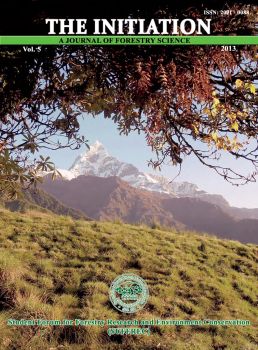Role of Agroforestry Practices in Changing Rural Livelihood Economy: Case study of Dhaibung VDC of Rasuwa District
DOI:
https://doi.org/10.3126/init.v5i0.10251Keywords:
Agro-forestry, Upland/lowland, Fodder, Livestock, Socio-economic developmentAbstract
This paper is part of the case study on “Socio-economic development of rural people through Agroforestry system in Rasuwa District of Nepal” surveyed during 2008. With the aim to assess the contribution of agro forestry to household economy of rural people, a study was conducted at Dhaibung VDC of Rasuwa district as agro forestry system creates employment and livelihood opportunity to the majority of the rural dwellers. Comparative study was done between agro forestry and non-agro forestry system village based on the project in terms of financial benefits and incentives received by respondents. Findings from the study revealed that agro forestry system practiced in project area; gross income and net income analysis in project village (PV) are more profitable than control village (CV) farms. Income from sale of livestock, fruits, milk and milk products was higher in project village as compared to control village whereas income from public services, wage labour was somehow same. The integration of agroforestry into existing farming system is the strongest driver to meet the food sufficiency of rural resident for longer months and ensure food security sustainably in the study area.
DOI: http://dx.doi.org/10.3126/init.v5i0.10251
The Initiation 2013 Vol.5; 32-42

